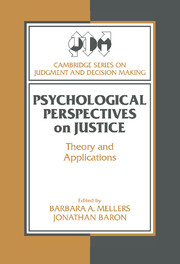Book contents
- Frontmatter
- Contents
- Series preface
- Contributors
- Part I Introduction
- Part II Psychological perspectives
- Part III Economic perspectives
- Part IV Variations in perspectives on justice
- Part V Policy perspectives
- Justice and the allocation of scarce resources
- Models of equity in public risk
- Fairness of distribution of risks with applications to Antarctica
- Part VI Conclusion
- Name index
- Subject index
Justice and the allocation of scarce resources
Published online by Cambridge University Press: 24 October 2009
- Frontmatter
- Contents
- Series preface
- Contributors
- Part I Introduction
- Part II Psychological perspectives
- Part III Economic perspectives
- Part IV Variations in perspectives on justice
- Part V Policy perspectives
- Justice and the allocation of scarce resources
- Models of equity in public risk
- Fairness of distribution of risks with applications to Antarctica
- Part VI Conclusion
- Name index
- Subject index
Summary
Local justice can be defined as the allocation by institutions of scarce goods and necessary burdens. In this chapter I discuss allocative practices in three arenas: the selection of patients for transplantation, the admission to selective institutions of higher education, and the selection of workers to be laid off when a firm decides to reduce its work force. Occasionally, I shall also refer to some other issues. The issue I consider in most detail is the allocation of organs, more specifically of kidneys. My concern is descriptive and explanatory, not prescriptive. The aim is not to evaluate allocative mechanisms from a particular normative point of view, but to identify the principles and procedures used to allocate scarce goods and necessary burdens, and to explain, in each case, why a certain principle is used. Normative considerations enter only to the extent that they have explanatory force. The process that results in the selection of an allocative principle involves a number of actors, within the allocative institution and outside it. Often, they appeal to normative premises when arguing for some allocative principle. Sometimes, these arguments are more or less thinly disguised rationalizations of self-interest, but often they spring from deeply held conceptions of what is a fair or equitable allocation. Although this explanatory use of normative principles will be the main focus of the essay, I shall occasionally step back and offer a few normative comments on my own account.
Different arenas use different principles for allocating scarce goods.
- Type
- Chapter
- Information
- Psychological Perspectives on JusticeTheory and Applications, pp. 259 - 278Publisher: Cambridge University PressPrint publication year: 1993
- 4
- Cited by



